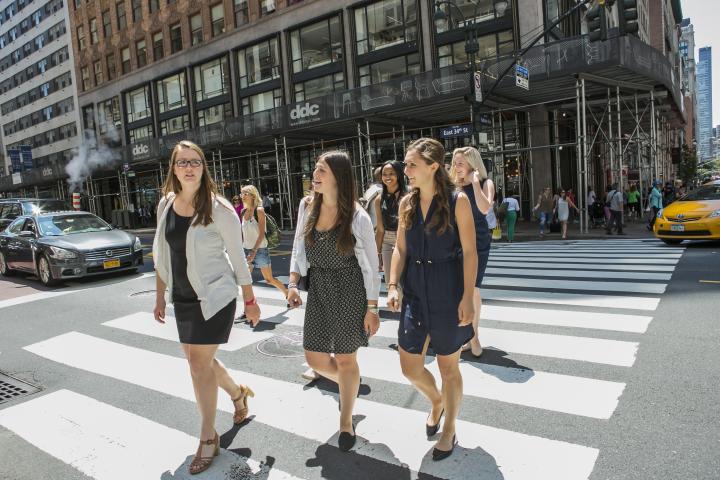
Peer Mentors Welcome New ILRies
LindaRose Piccolo ’24 summed up her peer mentor role this way: “It means being a friend and a smiling face in the hallways so that new ILRies feel they belong and have support in their new home.”
The ILR Peer Mentor Program supports first-year and transfer students through “Introduction to Industrial and Labor Relations” class, a required course in the new curriculum. Peer mentors facilitate icebreaker activities, advice panels and coffee chats to help new students navigate ILR and Cornell.
“It’s easy to feel lost on Cornell’s large campus, but it’s always comforting to know that there is an ILR community,” said Salima Ali ’23, a peer mentor program leader with Anne Bugayong ’23 and Alex Dempsey ’23.
Guided by ILR Assistant Dean for Student Experience and Wellbeing Kara Lombardi, the leaders create the training curriculum for peer mentors and equip them with the resources they need to lead their sections. The mentor program was established years ago, but this year marks the first time mentors are receiving structured training and professional development, she said.
“The peer mentors are such an important part of our community. I’m so glad that we’ve been able to incorporate a training and development component so they can come together as a group to learn together, share ideas and find connection with their co-peer mentors,” Lombardi said.
The training and development sessions were made possible through a gift from Joanne Restivo Jensen '84.
“I remember, as a first-generation college student, how overwhelmed I was as a freshman. Cornell can be a daunting place when you first arrive in Ithaca. Tackling coursework, adjusting to the social scene and finding clubs and groups to explore your passions can be overwhelming,” Jensen said.
“The peer mentor program gives our freshmen and transfer students a supportive network to help them more quickly adapt and be a part of our community,” she said.
For mentors such as Sri Ravisankar ’25, the role is a way to give back. “During my freshman year, I had so many questions about adjusting to East Coast weather, selecting classes and clubs, and striking an academic work-life balance. “
“Each week, my peer mentors would honestly and authentically share advice and experiences that helped me acclimate to Cornell and identify appropriate resources and campus services to address all the burning questions. I became a peer mentor because I wanted to pass on the wonderful support I received to incoming students,” Ravisankar said.
Samantha Ivey ’24, who began her Cornell experience during the height of the pandemic, said the peer mentor program is a way for her to build a community for others that she lacked during her first ILR semesters. She also encourages students to create support and compassion for one another outside of the peer mentor program.
Mentors said seeing students take on leadership roles, become peer mentors, join organizations and flourish at Cornell is rewarding. “The best part of being a peer mentor is seeing my students succeed,” Bugayong said. “You are there for many of the first-years during Orientation, and by the end of the semester, they've grown and learned so much.”


